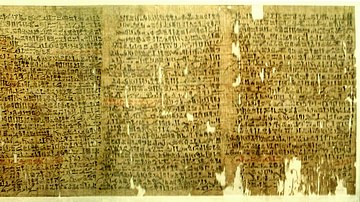Search
Did you mean: Eris?
Search Results

Image
Map of the Year of the Four Emperors, 69 CE
The Year of the Four Emperors (69 CE) was a moment of deep instability in the Roman Empire, marked by the rapid succession of Galba (June 68–January 69 CE), Otho (January–April 69 CE), Vitellius (April–December 69 CE), and Vespasian (69–79...

Image
Sea Hurricanes
A 1941 photograph of a flight of Sea Hurricanes, the naval equivalent of the RAF Hawker Hurricane fighter plane. (Imperial War Museums)

Article
Women in Ancient Egypt
Women in ancient Egypt were regarded as the equals of men in every aspect save that of occupation. The man was the head of the household and nation, but women ran the home and contributed to the stability of that nation as artisans, brewers...

Article
The Maccabean Revolt
The Maccabean Revolt of 167-160 BCE was a Jewish uprising in Judea against the repression of the Seleucid Empire. The revolt was led by a country priest called Mattathias, and his military followers became known as Maccabees. Successful...

Article
Ancient Egyptian Mortuary Rituals
Ever since European archaeologists began excavating in Egypt in the 18th and 19th centuries CE, the ancient culture has been largely associated with death. Even into the mid-20th century CE reputable scholars were still writing on the death-obsessed...

Article
Police in Ancient Egypt
In any society, members of the community recognize they are required to restrain certain impulses in order to participate in the community. Every civilization has had some form of law which makes clear that the benefits of peaceful coexistence...

Article
Zwingli's 67 Articles
Huldrych Zwingli (l. 1484-1531) wrote his 67 Articles in 1523 as a confession of faith to be presented at the First Disputation in Zürich where he defended his beliefs against accusations of heresy by the Catholic Church. Zwingli's 67 Articles...

Article
Stories from the Westcar Papyrus
The Westcar Papyrus, dated to the Second Intermediate Period of Egypt (1782 - c.1570 BCE), but most likely written during the Middle Kingdom (2040-1782 BCE), contains some of the most interesting tales from ancient Egypt. The papyrus takes...

Article
The Trial & Crucifixion of Jesus of Nazareth
The central pillars of Christianity originate from the story of the trial, crucifixion, and death of Jesus Christ. The events cover the time when Jesus of Nazareth and his followers entered Jerusalem for the festival of Passover to Sunday...

Article
Diversity in Church Architecture in Medieval England
Medieval English churches differed in size and layout. Their original and evolving role(s), financial and material resources, and architectural fashions helped determine variability. However, their look ultimately grew from a constant symbiosis...